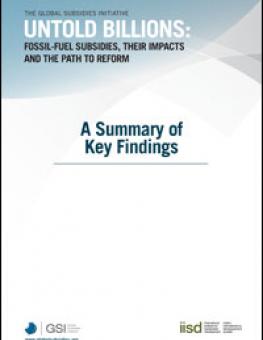
Untold Billions: Fossil-fuel subsidies, their impacts and the path to reform: A Summary of Key Findings
Untold Billions: Fossil-fuel subsidies, their impacts and the path to reform is a report summarizing a project that includes series of papers examining the extent of fossil-fuel subsidies, their impact on climate change and sustainable development more broadly, and the challenges to their reform. The aim of the project is to take the first and necessary steps toward a better understanding of the scope and role of fossil-fuel subsidies in the world economy. The papers provide a detailed overview, setting out what is currently known about subsidies to this sector and addressing key areas that need to be tackled for countries to undertake reform initiatives.
This report presents two introductory forewords to the issue of fossil-fuel subsidy reform. The first is by José María Figueres, Chairman of the Board, Carbon War Room, and Former President of Costa Rica, and the second is by Achim Steiner, United Nations Under-Secretary General and United Nations Environment Programme (UNEP) Executive Director. It then summarizes the key messages from the five core research papers in the Untold Billions series:
- Untold Billions: Fossil-fuel subsidies, their impacts and the path to reform: A Summary of Key Findings
- Effects of Fossil-Fuel Subsidy Reform: A review of modelling and empirical studies
- The Politics of Fossil-Fuel Subsidies
- Strategies for Reforming Fossil-Fuel Subsidies: Practical lessons from Ghana, France and Senegal
- Gaining Traction: The importance of transparency in accelerating the reform of fossil-fuel subsidies
- Mapping the Characteristics of Producer Subsidies: A review of pilot country studies
For information about the GSI's other reports on fossil-fuel subsidies, click here.
You might also be interested in
Sustainable Asset Valuation of Sherwan Hill Adventure Park in Abbottabad, Pakistan
This report analyzes the social, economic, and environmental benefits of the Sherwan Hill Adventure Park in Pakistan.
December 2024 | Carbon Minefields Oil and Gas Exploration Monitor
In November 2024, 23 oil and gas exploration licences were awarded across five countries, with Russia granting the licences that account for the largest portion of embodied emissions.
Toward a Coherent, Transformative Approach to Financing Sustainable Development, Climate, and Nature
Four key proposals for the Fourth Financing for Development Conference (FfD4) to create an integrated, equitable approach to financing climate, nature, and development goals.
Green Public Procurement in India
This report analyzes the status of green public procurement (GPP) in India and suggests key strategies for advancing sustainable procurement practices.